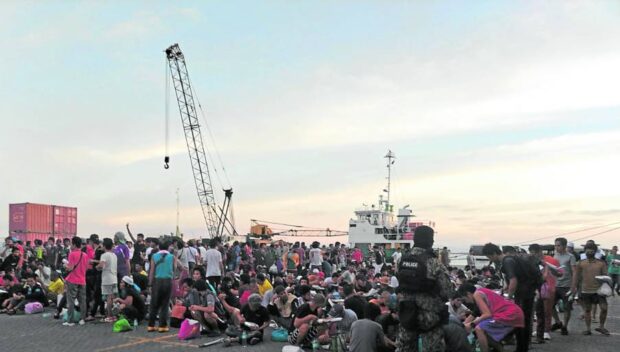
SECOND BATCH | About 800 Filipinos who had just arrived from Sabah await transport to a facility of the Department of Social Welfare and Development. (Photo from the Zamboanga Peninsula Police Region Office)
ZAMBOANGA CITY, Zamboanga del Sur, Philippines — Some 800 deportees from Sabah arrived here on Thursday aboard a commercial vessel, social welfare officials said.
This is the second batch of deportation this year as part of Malaysia’s continuing crackdown against illegal immigrants.
Although the crackdown has been regularly done by Malaysian immigration authorities, these activities became intense following its legal dispute with the heirs of the Sultanate of Sulu starting in 2019.
The sultanate’s heirs secured a $14.9 billion award from a French arbitration court pertaining to Sabah, over which they lay a proprietary claim.
Last year, Malaysia scored a legal victory after a Paris appeals court said the arbitral tribunal that handed the award had no jurisdiction over the case.Ivan Eric Salvador, spokesperson for the Department of Social Welfare and Development (DSWD) in Region 9, said the deportees arrived at the port here in the afternoon of Jan. 25 aboard MV Antonia, a passenger liner of Aleson Shipping Lines that regularly ply between this city and Sabah.
Of the 800 deportees, 97 were minors, of whom 61 were boys and 36 girls, Salvador said. Of the adults, 602 were men and 101 were women.
They are temporarily sheltered at the Processing Center for Displaced Persons, one of the DSWD facilities in Barangay Mampang here, for profiling.
“Initial profiling showed they were jailed in Kota Kinabalu and Sandakan as undocumented immigrants,” Salvador said.
The Police Regional Office 9 (PRO 9), facilitated the transfer and transport of the deportees from the port to the DSWD facility.
Police assistance
Brig. Gen. Bowenn Joey Masauding, regional director of PRO 9, said they tapped the personnel from the Regional Mobile Force Battalion 9, Regional Logistics and Research Development Division, and Regional Community Affairs and Development Division for the safe and secure transport of the deportees, officially referred to by authorities as “returning Filipinos.”
“We have one truck vehicle traveling back and forth from the Zamboanga City port area to the DSWD facility in Mampang. We started at 3 p.m. and ended around 10 p.m.,” Masauding said.
“I wish to express my sincerest gratitude to our dedicated PNP personnel who are always ready to help and assist, especially in providing safety and security to our returning Filipinos. In times of crisis and uncertainty, it is our collective spirit of compassion and support that will encourage hope and bring inspiration to the community,” Masauding added.
Salvador said the first batch of returning Filipinos arrived on Jan. 11 numbering 680. In 2023, they attended to 6,409 deportees who were eventually sent back to their respective hometowns.
Places of origin
Most of the deportees are from Mindanao, although many also come from the Eastern and Central Visayas regions.
Zamboanga City Rep. Khymer Olaso urged the national government to look deeper and address the continuing travel of poor undocumented Filipinos to Sabah, using the so-called southern backdoor.
Olaso, who worked as ship captain for MV Antonia before he was elected into office, recalled that the deportations started in 1992.
“Although the Malaysian government deports them, these Filipinos will always find ways to return to Malaysia, but the sad fact is they are undocumented, [having] no papers,” he noted.
Most of those who sneak into the country’s closest neighbor do so in search of greener pastures, especially in Sabah’s vast agricultural plantations. Many of them were brought there by traffickers.
Last week, the Philippine Coast Guard (PCG), in cooperation with other government agencies, launched a study of trafficking routes.
Close to a hundred experts, professionals, and boat crew members departed here on Jan. 21, aboard PCG’s BRP Gabriela Silang, for a six-day voyage aimed at enhancing the country’s capabilities in preventing human trafficking and migrant smuggling.
Justice Undersecretary Nicolas Felix Ty also of the Inter-agency Council Against Trafficking, explains that the voyage is significant “because we all know how significant the problem of human trafficking is in the country.
